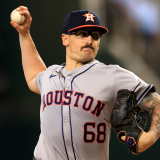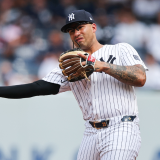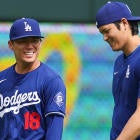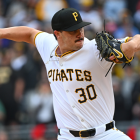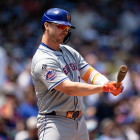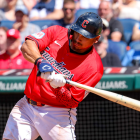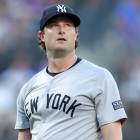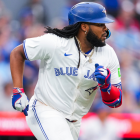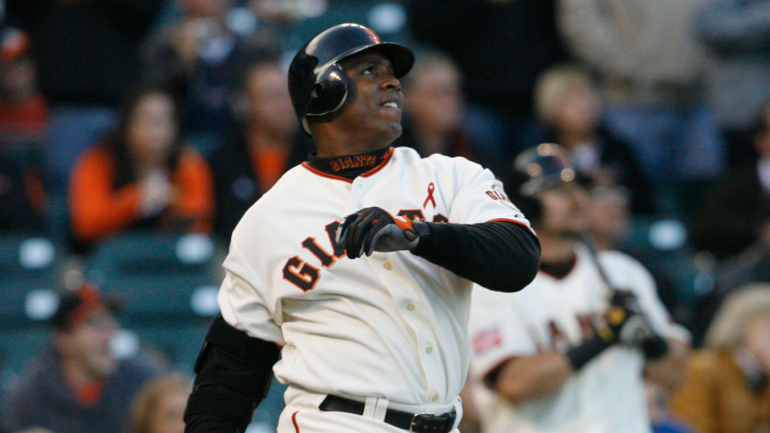
Earlier this week, the baseball world lost one of our heroes in Willie Mays. He lived 93 incredible years and left it all on the field. Given that he has a great case as the best baseball player of all time, Mays has carried the unofficial title of "greatest living player" for at least a few years (Hank Aaron died in 2021) and probably for decades.
Who takes the mantle now?
Well, the short answer is this was a hell of a lot easier question these last few years with Mays alive. Especially once Aaron passed, Mays was the easy and obvious answer. Now, it isn't so easy.
I'll run through the options and and let you decide. I'll name my pick at the end, just in case anyone is itching to yell at me for being wrong when there's no wrong answer. To be clear, yes, I considered every single name you'll throw at me, but I'm not going to give a subhead below to every single great player. These are the only players in consideration for the very top spot.
I've narrowed the field to 12 and I'll list them alphabetically. We're using Baseball Reference's version of WAR.
Johnny Bench
Career WAR: 75.1
The WAR here will be lacking when compared to others on the list, but one number never tells the whole story. Bench's story includes being the greatest catcher of all time. The most physically demanding position there is takes such a toll on the body that it's impossible for catchers to match the production and longevity that players at other positions accrue.
Bench won a Rookie of the Year and two MVPs while serving as the starting catcher for two World Series champions, including 1976 when he was the World Series MVP.
He topped 40 homers twice and ended with 389, an exceptional number for a catcher. He topped 100 RBI six times and ended with 1,376. He hit .267/.342/.476 (126 OPS+) with 2,048 hits.
His work behind the plate should turn heads, of course. In his entire career, he cut down a ridiculous 43% of would-be base-stealers (for a point of reference, the league average in 2024 is 22%). It's possible he's the best defensive catcher ever and he was a hell of a hitter while doing it.
Barry Bonds
Career WAR: 162.8
Bonds won a record seven MVPs. He led the league in on-base percentage 10 times, slugging percentage seven times and is a career .298/.444/.607 hitter, which is good for a monstrous 182 OPS+. He won two batting titles. He is the all-time leader in home runs at 762. He ended with 2,935 hits, 601 doubles, 1,996 RBI, 2,227 runs and a record 2,558 walks. He also stole 514 bases and won eight Gold Gloves.
There is, of course, the whole PED connection. If you believe there's an asterisk next to Bonds, that's where it comes from. If you believe it disqualifying, he's not the greatest living player. If not, he's probably your pick.
Roger Clemens
Career WAR: 139.2
I'm glad these two fell back-to-back alphabetically. Clemens is tantamount to the pitcher version of Bonds. He's got a record seven Cy Youngs and even won an MVP. He won the ERA title seven times. He racked up an absurd 4,672 strikeouts and won 354 games. If not for the PED connection, he'd likely be viewed as the greatest pitcher of all-time, but there is a connection.
So, again, it depends upon how you feel there. Still, he probably wouldn't win the greatest living player crown over Bonds because pitchers are generally slotted behind position players.
Ken Griffey Jr.
Career WAR: 83.8
Up until the turn of the millennium, Griffey vs. Bonds was a really fun -- and possibly even heated -- debate. I always sided with Bonds. After that, though, injuries wrecked Griffey's career while Bonds propelled into the stratosphere, possibly with the help of PEDs.
Anyone who wants to disqualify the likes of Bonds, Clemens and A-Rod (we'll get to him) from this discussion might want to point to Junior as an example of a clean player's arc. Griffey ended up with 630 home runs and 1,836 RBI. He also had 2,781 hits and 1,662 runs. He finished with an OPS north of .900, good for a 136 OPS+. He was amazing in center field defensively until the injuries started to take their toll, too, while also stealing 184 bases. He wasn't Mays -- who was? -- but he followed in his footsteps as a true five-tool superstar in center.
Rickey Henderson
Career WAR: 111.1
Rickey spent parts of 25 seasons in the majors and was such a dynamic talent that you could argue he led to an explosion in stolen bases through the '80s. He was the greatest leadoff man in baseball history, an on-base machine who stole 1,406 bases (no one else has ever even reached 1,000!) and scored 2,295 runs (the most in history). He walked 2,190 times while gathering 3,055 hits, putting him fourth all-time in times on base behind Pete Rose, Bonds and Ty Cobb.
Most people think of power when looking for a greatest player and while Rickey hit for good power for a leadoff man, he wasn't a power hitter. Don't overlook him due to this, though, because if you're putting together an all-time lineup, he'd be your leadoff man. There's something to be said for that.
Randy Johnson
Career WAR: 101.1
The Big Unit won five Cy Youngs and 303 games along with 4,875 strikeouts. He won four ERA titles and took four straight Cy Youngs through the heart of one of baseball's greatest offensive eras. When offense was off the charts, he was still dominant.
I don't think he's the pick here, but he deserved to be included with a writeup.
Greg Maddux
Career WAR: 106.6
Perhaps the greatest precision pitcher there has ever been, Maddux wasn't considered a power pitcher and still ended up with 3,371 strikeouts. The four-time Cy Young winner ended his career with 355 wins and four ERA titles. He led the league in innings pitched five straight years through his prime.
Again, he's likely not the winner here, but I'll include him for two reasons. First because he deserves it and second in the hope that people quit comparing every non-power pitcher to him.
Pedro Martínez
Career WAR: 83.9
I have said many times and I'll say it many more: Prime Pedro was the greatest pitcher baseball has ever seen.
That is to say that Pedro Martínez had a seven-year window through the so-called Steroid Era where offense was as ridiculous as it ever was where he was still so unbelievably dominant that we couldn't look away.
From 1997-2003, Pedro's average season was 17-5 with a 2.20 ERA (213 ERA+), 0.94 WHIP and 252 strikeouts against 45 walks. Perhaps the best illustration of his absurd dominance is the year 2000. His ERA was 1.74. Roger Clemens finished second ... at 3.70. Pedro's WHIP was 0.73. Second place was Mike Mussina at 1.19. Pedro's WAR was 11.7. Second among pitchers was Brad Radke at 6.2.
The league-average ERA, by the way, was 4.91.
Martínez finished his career with a 219-100 record and 3,154 strikeouts in 2,827 1/3 innings, illustrating how his longevity probably didn't stand up well enough for him to win this argument.
We'll mention here that Sandy Koufax is still alive at age 88. There will be some people wanting to name Koufax the greatest living player. Like Pedro, he had a window of complete and utter dominance. Unlike Pedro, that was about it. Before 1962, Koufax was little more than a league-average pitcher. He was 54-53 with a 3.94 ERA (105 ERA+). After that, he won five straight ERA titles and went 111-34 with a 1.95 ERA (167 ERA+) and 0.93 WHIP. He averaged 289 strikeouts against 63 walks per season. And then that was it, sadly. He finished with 165 wins, 2,396 strikeouts, three Cy Youngs and an MVP. The league at the time was so much more pitcher-friendly that it led to a lowered mound and the designated hitter and this matters, because ...
Whatever case you have for Koufax, Pedro's case is better as he did it for longer and in a significantly more difficult environment for pitchers. If you wanted a point of comparison on WAR, Koufax's is 48.9, but I'm guessing anyone strenuously arguing for Koufax would outright dismiss that stat.
Mike Schmidt
Career WAR: 106.9
Is it possible that the greatest third baseman of all-time is actually underrated? I think he is. Why? Because he was a career .267 hitter through an era that only seriously looked at batting average among the three main rate stats for hitters. Schmidt took a ton of walks and hit for great power, though, helping his .380 on-base percentage and .527 slugging percentage to push him to a 148 OPS+. He led the league in home runs eight times and finished with 548. He drove home 1,595, thanks to nine 100-RBI seasons (and he led the majors with 91 RBI in the strike-shortened 1981 season). He won three MVPs.
Through all that, Schmidt was one of the greatest defensive third baseman ever, too, though following Brooks Robinson probably made him a bit underrated there, as well. Schmidt won 10 Gold Gloves. He was World Series MVP in 1980, the Phillies' first-ever title.
It isn't close to catcher, but third base has long been such a demanding position that it was the most overlooked in Hall of Fame voting for years. Schmidt ranks first all-time among third baseman in WAR and JAWS.
He would be a very strong selection here.
Albert Pujols
Career WAR: 101.4
The Machine was well on his way to putting himself in the conversation with players like Aaron during his time in St. Louis. He backslid a bit in Anaheim, notably in the second half of that contract. Still, the body of work shows three MVPs, 3,384 hits, 686 doubles, 703 home runs, 2,218 RBI, 1,914 runs and a career .294/.374/.544 slash, which is a 145 OPS+. He also finished second in MVP voting four times and won two World Series rings.
And do you remember how scary it was for your favorite team to face him in a big spot? Good grief, man. I think I still have nightmares.
Through his age-29 season, the most similar hitters to Pujols, statistically, were Jimmie Foxx, Miguel Cabrera (hey, I'm glad we got to mention Miggy here!), Hank Aaron and Lou Gehrig. Hoo boy.
Mariano Rivera
Career WAR: 56.3
I don't think a closer can possibly be the best ever, but Rivera was the only player to get 100% of the Hall of Fame vote. He gets a name check here and certainly has the biggest separation between himself and the rest of his peers at a position, if we consider "reliever" a different position than pitcher.
Alex Rodríguez
Career WAR: 117.6
We probably don't need to spend much time here, right? If you believe what happened on the field, regardless of circumstance, is how we should judge the player, A-Rod is one of the greatest players the game has ever seen. He's also behind Bonds. If you believe the PED-connected players get asterisks and shouldn't be considered, A-Rod gets thrown out.
So, A-Rod, in the immortal words of Adrian Balboa, you can't win!
Just in case you think I forgot anyone ...
Next highest career WAR among living players: Cal Ripken Jr., Bert Blyleven, Adrian Beltre, Wade Boggs, George Brett, Mike Trout
People have mentioned Shohei Ohtani and while he legitimately might be the most talented player we've ever seen, he's gotta do it a lot longer to gain entry onto this list. There's always a segment of people howling about Pete Rose and while he hit over .300 and was a great hit compiler, his entire body of work just doesn't get him close here. Speaking of which, Ichiro Suzuki is in a similar zone, though he was a more well-rounded player. I'm not sure who else would be considered for the absolute top spot. We'd only be nitpicking if wanting people like Miguel Cabrera mentioned, since he's inferior to Pujols (and that's no insult).
My pick: Bonds. I understand the pushback, but he was the best player I've ever seen.
If you want me to pick a "clean" player, fine: I'll take Schmidt. I strongly considered Rickey and tried to figure if I could justify just taking "Prime Pedro." Between a slugging outfielder, third baseman, leadoff man and pitcher, this seems like a well-rounded enough group to call them my Mount Rushmore of living players.
The big question is: Who is your pick?







